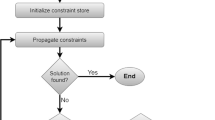Abstract
This paper discusses a two-stage assembly-type flowshop scheduling problem with batching considerations subject to a fixed job sequence. The two-stage assembly flowshop consists of m stage-1 parallel dedicated machines and a stage-2 assembly machine which processes the jobs in batches. Four regular performance metrics, namely, the total completion time, maximum lateness, total tardiness, and number of tardy jobs, are considered. The goal is to obtain an optimal batching decision for the predetermined job sequence at stage 2. This study presents a two-phase algorithm, which is developed by coupling a problem-transformation procedure with a dynamic program. The running time of the proposed algorithm is O(mn+n 5), where n is the number of jobs.






Similar content being viewed by others
References
Allahverdi A, Gupta JND and Aldowaisan T (1999). A review of scheduling research involving setup considerations. Omega 27: 219–239.
Cheng TCE and Wang G (1999). Scheduling the fabrication and assembly of components in a two-machine flowshop. IIE Trans 31: 135–143.
Cheng TCE, Gupta JND and Wang G (2000a). A review of flowshop scheduling research with setup times. Prod Opns Mngt 9: 262–282.
Cheng TCE, Lin BMT and Tian YM (2009). Scheduling of a two-stage differentiation flowshop to minimise weighted sum of machine completion times. Comput Opns Res 36: 3031–3040.
Cheng TCE, Lin BMT and Toker A (2000b). Makespan minimization in the two-machine flowshop batch scheduling problem. Nav Res Log 47: 128–144.
Herrmann JW and Lee CY (1992). Three-machine look-ahead scheduling problems. Research Report No. 92–93, Department of Industrial Engineering, University of Florida, FL.
Hwang FJ (2011). Scheduling problems subject to fixed job sequences. PhD Dissertation, Institute of Information Management, National Chiao Tung University, Taiwan.
Hwang FJ and Lin BMT (2011). Coupled-task scheduling on a single machine subject to a fixed-job-sequence. Comput Indust Eng 60: 690–698.
Hwang FJ, Kovalyov MY and Lin BMT (2010). Minimization of total completion time in flowshop scheduling subject to fixed job sequences. In: Proceedings of 12th International Workshop on Project Management and Scheduling, Tours, France, pp 249–252.
Johnson SM (1954). Optimal two and three-stage production schedules with setup times included. Nav Res Log Q 1: 61–68.
Lee CY, Cheng TCE and Lin BMT (1993). Minimizing the makespan in the 3-machine assembly-type flowshop scheduling problem. Mngt Sci 39: 616–625.
Lin BMT and Cheng TCE (2005). Two-machine flowshop batching and scheduling. Ann Opns Res 133: 149–161.
Lin BMT and Cheng TCE (2006). Two-machine flowshop scheduling with conditional deteriorating second operations. Int Trans Opl Res 13: 91–98.
Lin BMT and Cheng TCE (2011). Scheduling with centralized and decentralized batching policies in concurrent open shops. Nav Res Log 58: 17–27.
Lin BMT and Hwang FJ (2011). Total completion time minimization in a 2-stage differentiation flowshop with fixed sequences per job type. Inform Process Lett 111: 208–212.
Lin BMT, Cheng TCE and Chou ASC (2007). Scheduling in an assembly-type production chain with batch transfer. Omega—Int J Mngt Sci 35: 143–151.
Ng CT and Kovalyov MY (2007). Batching and scheduling in a multi-machine flow shop. J Scheduling 10: 353–364.
Potts CN and Kovalyov MY (2000). Scheduling with batching: A review. Eur J Opl Res 120: 228–249.
Potts CN and Van Wassenhove LN (1992). Integrating scheduling with batching and lot-sizing: A review of algorithms and complexity. J Opl Res Soc 43: 395–406.
Potts CN and Whitehead JD (2007). Heuristics for a coupled-operation scheduling problem. J Opl Res Soc 58: 1375–1388.
Shafransky YM and Strusevich VA (1998). The open shop scheduling problem with a given sequence of jobs on one machine. Nav Res Log 45: 705–731.
Acknowledgements
The authors are grateful to the anonymous reviewers for their constructive comments that have improved an earlier version of this paper.
Author information
Authors and Affiliations
Corresponding author
Rights and permissions
About this article
Cite this article
Hwang, F., Lin, B. Two-stage assembly-type flowshop batch scheduling problem subject to a fixed job sequence. J Oper Res Soc 63, 839–845 (2012). https://doi.org/10.1057/jors.2011.90
Received:
Accepted:
Published:
Issue Date:
DOI: https://doi.org/10.1057/jors.2011.90




